高中生英语作文及翻译:文明旅游
- 格式:docx
- 大小:37.34 KB
- 文档页数:1
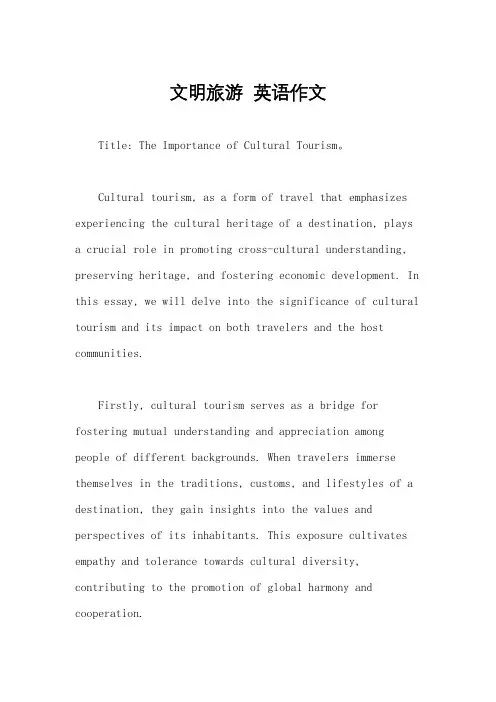
文明旅游英语作文Title: The Importance of Cultural Tourism。
Cultural tourism, as a form of travel that emphasizes experiencing the cultural heritage of a destination, plays a crucial role in promoting cross-cultural understanding, preserving heritage, and fostering economic development. In this essay, we will delve into the significance of cultural tourism and its impact on both travelers and the host communities.Firstly, cultural tourism serves as a bridge for fostering mutual understanding and appreciation among people of different backgrounds. When travelers immerse themselves in the traditions, customs, and lifestyles of a destination, they gain insights into the values and perspectives of its inhabitants. This exposure cultivates empathy and tolerance towards cultural diversity, contributing to the promotion of global harmony and cooperation.Furthermore, cultural tourism plays a pivotal role in the preservation and promotion of heritage sites and intangible cultural assets. Many destinations rely on tourism revenue to maintain historical landmarks, museums, and traditional arts. By attracting visitors, these sites receive the necessary funding for conservation efforts, ensuring that future generations can continue to appreciate their cultural legacy. Moreover, cultural tourism encourages communities to celebrate and showcase their unique heritage, thus revitalizing traditions and preventing cultural erosion in an increasingly globalized world.Economically, cultural tourism is a powerful driver of local development, generating revenue and employment opportunities for host communities. The influx of tourists stimulates demand for goods and services, leading to the growth of small businesses, hotels, restaurants, and artisanal crafts. Additionally, cultural tourism often promotes sustainable practices that prioritize the preservation of the environment and the well-being of localresidents. By integrating sustainable tourism principles, destinations can minimize negative impacts such as overdevelopment, pollution, and exploitation of cultural resources, while maximizing the benefits for both tourists and locals.In conclusion, cultural tourism plays a multifaceted role in promoting intercultural dialogue, preserving heritage, and stimulating socio-economic development. As travelers venture beyond their familiar surroundings to explore new cultures and traditions, they not only enrich their own lives but also contribute to the mutual enrichment of humanity as a whole. Therefore, fostering a supportive environment for cultural tourism is essential for building a more interconnected and harmonious global community.。
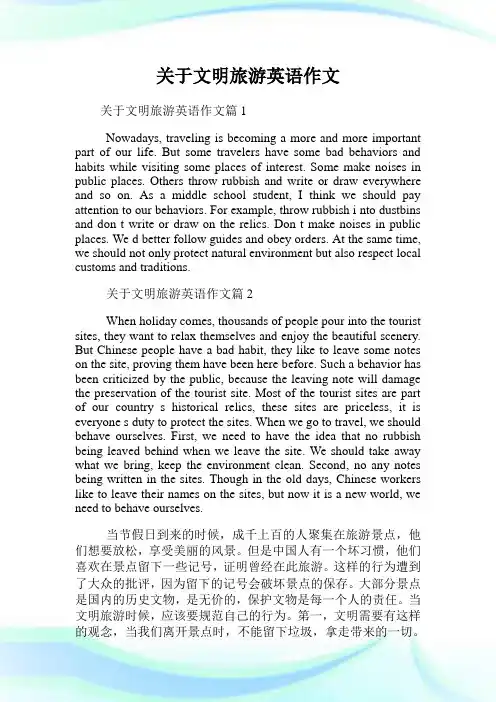
关于文明旅游英语作文关于文明旅游英语作文篇1Nowadays, traveling is becoming a more and more important part of our life. But some travelers have some bad behaviors and habits while visiting some places of interest. Some make noises in public places. Others throw rubbish and write or draw everywhere and so on. As a middle school student, I think we should pay attention to our behaviors. For example, throw rubbish i nto dustbins and don t write or draw on the relics. Don t make noises in public places. We d better follow guides and obey orders. At the same time, we should not only protect natural environment but also respect local customs and traditions.关于文明旅游英语作文篇2When holiday comes, thousands of people pour into the tourist sites, they want to relax themselves and enjoy the beautiful scenery. But Chinese people have a bad habit, they like to leave some notes on the site, proving them have been here before. Such a behavior has been criticized by the public, because the leaving note will damage the preservation of the tourist site. Most of the tourist sites are part of our country s historical relics, these sites are priceless, it is everyone s duty to protect the sites. When we go to travel, we should behave ourselves. First, we need to have the idea that no rubbish being leaved behind when we leave the site. We should take away what we bring, keep the environment clean. Second, no any notes being written in the sites. Though in the old days, Chinese workers like to leave their names on the sites, but now it is a new world, we need to behave ourselves.当节假日到来的时候,成千上百的人聚集在旅游景点,他们想要放松,享受美丽的风景。
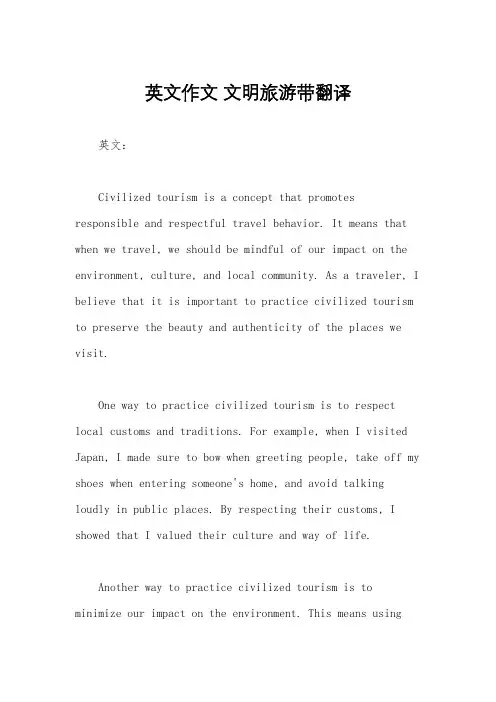
英文作文文明旅游带翻译英文:Civilized tourism is a concept that promotes responsible and respectful travel behavior. It means that when we travel, we should be mindful of our impact on the environment, culture, and local community. As a traveler, I believe that it is important to practice civilized tourism to preserve the beauty and authenticity of the places we visit.One way to practice civilized tourism is to respect local customs and traditions. For example, when I visited Japan, I made sure to bow when greeting people, take off my shoes when entering someone's home, and avoid talkingloudly in public places. By respecting their customs, I showed that I valued their culture and way of life.Another way to practice civilized tourism is to minimize our impact on the environment. This means usingeco-friendly products, reducing waste, and conserving resources. For example, when I went camping in the mountains, I made sure to bring reusable water bottles, biodegradable soap, and a portable stove instead of using disposable products. By doing so, I left the campsite as pristine as I found it.Lastly, we should also support local businesses and communities when we travel. This means buying locally made products, eating at local restaurants, and staying inlocally owned accommodations. By doing so, we contribute to the local economy and help preserve the unique character of the place we visit.In summary, civilized tourism is about being respectful, responsible, and mindful when we travel. By practicing civilized tourism, we can help preserve the beauty and authenticity of the places we visit, and leave a positive impact on the environment and local communities.中文:文明旅游是一个促进负责任和尊重的旅行行为的概念。
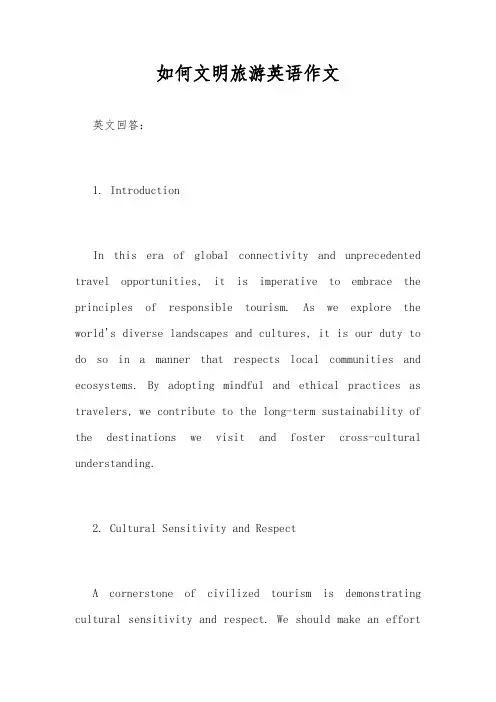
如何文明旅游英语作文英文回答:1. IntroductionIn this era of global connectivity and unprecedented travel opportunities, it is imperative to embrace the principles of responsible tourism. As we explore the world's diverse landscapes and cultures, it is our duty to do so in a manner that respects local communities and ecosystems. By adopting mindful and ethical practices as travelers, we contribute to the long-term sustainability of the destinations we visit and foster cross-cultural understanding.2. Cultural Sensitivity and RespectA cornerstone of civilized tourism is demonstrating cultural sensitivity and respect. We should make an effortto understand the customs, traditions, and values of the places we visit. This includes dressing appropriately, learning basic local phrases, and being mindful of our behavior in public spaces. By showing respect for local cultures, we not only avoid causing offense but also foster an atmosphere of mutual understanding and appreciation.3. Environmental ConservationAs responsible travelers, we have an obligation to minimize our impact on the environment. This involves reducing our carbon footprint by choosing sustainable modes of transportation, conserving water and energy, and disposing of waste properly. We should also be mindful of the fragility of natural ecosystems and avoid activities that could damage wildlife or delicate habitats. By being environmentally conscious, we preserve the natural beauty and biodiversity of the destinations we visit for future generations.4. Economic SustainabilityTourism can be a significant economic driver for local communities. As ethical travelers, we should support local businesses whenever possible. This includes patronizing small hotels and restaurants, purchasing souvenirs from local artisans, and using local tour operators. By investing in the local economy, we create jobs, contribute to sustainable livelihoods, and empower communities to preserve their cultural heritage.5. Ethical Interactions and Cultural ExchangeRespectful and ethical interactions are crucial for creating meaningful travel experiences. We should approach encounters with local people with a genuine desire to learn about their lives and perspectives. Avoiding patronizing attitudes, engaging in conversations with locals, and respecting their privacy fosters genuine cultural exchange. By embracing curiosity and understanding, we break down barriers and build bridges between cultures.6. ConclusionCivilized tourism is not merely about visiting destinations but about embracing a mindset of respect, responsibility, and cultural sensitivity. By incorporating these principles into our travels, we become ambassadors for sustainable and ethical tourism. We create lasting connections with the people and places we encounter, preserve the natural environment, and contribute to the well-being of local communities. Let us all strive to be responsible and ethical travelers, leaving a positive legacy on the world we explore.中文回答:1. 引言在这个全球互联且旅行机会空前的时代,践行负责任的旅游原则至关重要。
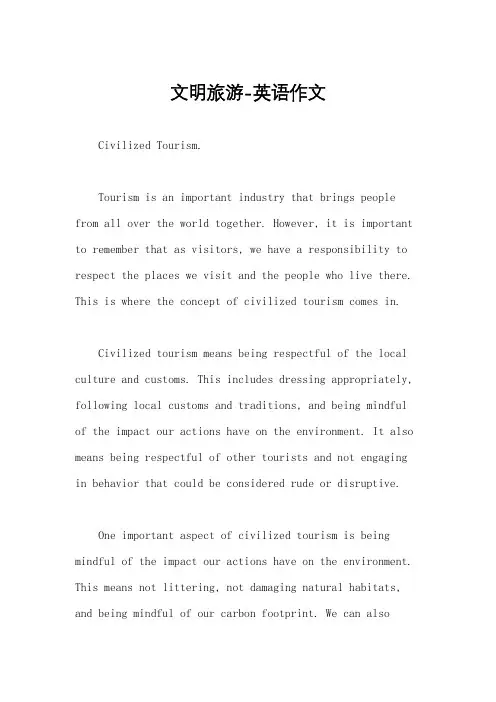
文明旅游-英语作文Civilized Tourism.Tourism is an important industry that brings people from all over the world together. However, it is important to remember that as visitors, we have a responsibility to respect the places we visit and the people who live there. This is where the concept of civilized tourism comes in.Civilized tourism means being respectful of the local culture and customs. This includes dressing appropriately, following local customs and traditions, and being mindful of the impact our actions have on the environment. It also means being respectful of other tourists and not engaging in behavior that could be considered rude or disruptive.One important aspect of civilized tourism is being mindful of the impact our actions have on the environment. This means not littering, not damaging natural habitats, and being mindful of our carbon footprint. We can alsosupport local conservation efforts by visiting national parks and other protected areas.Another aspect of civilized tourism is respecting the local culture and customs. This means dressingappropriately and being mindful of local customs and traditions. For example, in some countries it is considered disrespectful to wear shorts or sleeveless shirts in public. We should also be respectful of local religious practices and customs.Finally, civilized tourism means being respectful of other tourists. This means not engaging in behavior that could be considered rude or disruptive, such as cutting in line or being loud and obnoxious. We should also be mindful of our actions and how they may impact others, such as not taking up too much space on public transportation.In conclusion, civilized tourism means being respectful of the places we visit and the people who live there. It means being mindful of our impact on the environment, respecting local culture and customs, and being respectfulof other tourists. By practicing civilized tourism, we can help ensure that tourism remains a positive force for everyone involved.。
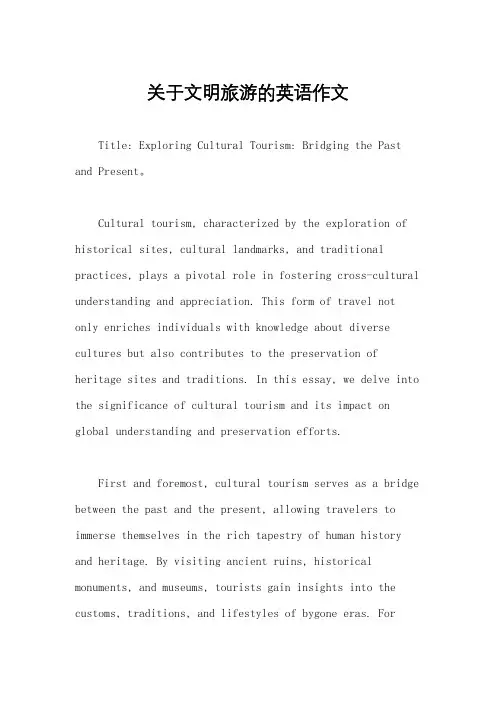
关于文明旅游的英语作文Title: Exploring Cultural Tourism: Bridging the Past and Present。
Cultural tourism, characterized by the exploration of historical sites, cultural landmarks, and traditional practices, plays a pivotal role in fostering cross-cultural understanding and appreciation. This form of travel not only enriches individuals with knowledge about diverse cultures but also contributes to the preservation of heritage sites and traditions. In this essay, we delve into the significance of cultural tourism and its impact on global understanding and preservation efforts.First and foremost, cultural tourism serves as a bridge between the past and the present, allowing travelers to immerse themselves in the rich tapestry of human history and heritage. By visiting ancient ruins, historical monuments, and museums, tourists gain insights into the customs, traditions, and lifestyles of bygone eras. Forinstance, a visit to the Great Wall of China not onlyoffers breathtaking views but also provides a glimpse into the architectural marvels and defensive strategies of ancient China. Similarly, exploring the pyramids of Egypt unveils the mysteries of ancient Egyptian civilization, showcasing their advanced knowledge of architecture, engineering, and astronomy.Furthermore, cultural tourism fosters intercultural exchange and dialogue, promoting mutual respect and understanding among people from different backgrounds. Through interactions with local communities, artisans, and historians, tourists gain firsthand experiences of diverse cultures, traditions, and perspectives. These encounters not only break down stereotypes and prejudices but also create opportunities for meaningful cross-cultural connections. For example, participating in traditional ceremonies, culinary workshops, or folk performances allows tourists to appreciate the cultural heritage of a destination while forging bonds with the local population.Moreover, cultural tourism plays a vital role in thepreservation and promotion of cultural heritage and traditions. As tourists visit historical sites and cultural landmarks, they contribute to the economic development of local communities, incentivizing authorities to invest in the restoration and conservation of these assets. Additionally, the influx of visitors creates awareness about the significance of preserving cultural heritage, prompting governments and organizations to implement sustainable tourism practices and heritage management policies. By striking a balance between tourism development and conservation efforts, destinations can ensure the long-term sustainability of their cultural treasures for future generations to cherish and explore.However, cultural tourism also presents challenges and ethical considerations that need to be addressed. The commodification of culture, cultural appropriation, and overtourism are some of the issues that threaten the authenticity and integrity of cultural experiences. Therefore, it is imperative for stakeholders, including governments, tour operators, and local communities, to adopt responsible tourism practices that prioritizecultural sensitivity, environmental sustainability, and community empowerment. By promoting cultural diversity, respecting local traditions, and engaging in meaningful dialogue with host communities, tourists can contribute to the preservation and revitalization of cultural heritage while minimizing negative impacts on the environment and society.In conclusion, cultural tourism serves as a powerful vehicle for promoting intercultural understanding, preserving cultural heritage, and fostering sustainable development. By immersing ourselves in the rich tapestry of human civilization, we not only enrich our own lives but also contribute to the preservation and promotion of cultural diversity worldwide. As responsible travelers, let us embrace the transformative power of cultural tourism and strive to create meaningful connections with the past, present, and future of our shared heritage.。
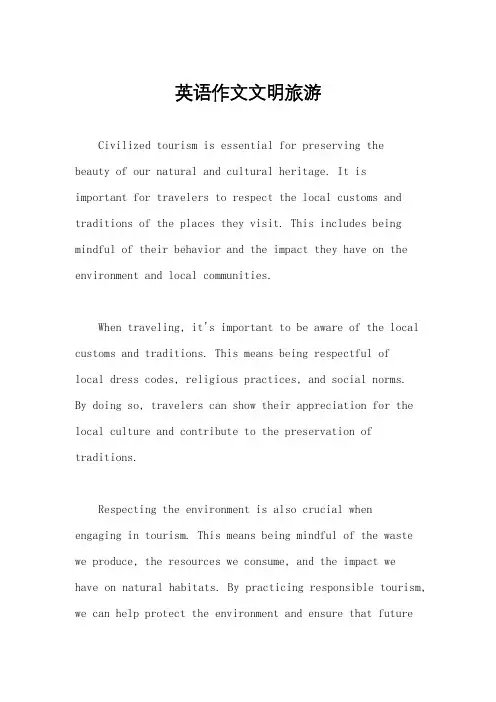
英语作文文明旅游Civilized tourism is essential for preserving thebeauty of our natural and cultural heritage. It isimportant for travelers to respect the local customs and traditions of the places they visit. This includes being mindful of their behavior and the impact they have on the environment and local communities.When traveling, it's important to be aware of the local customs and traditions. This means being respectful oflocal dress codes, religious practices, and social norms.By doing so, travelers can show their appreciation for the local culture and contribute to the preservation of traditions.Respecting the environment is also crucial when engaging in tourism. This means being mindful of the waste we produce, the resources we consume, and the impact wehave on natural habitats. By practicing responsible tourism, we can help protect the environment and ensure that futuregenerations can continue to enjoy the beauty of the world.In addition to respecting local customs and the environment, it's important for travelers to be considerate of the local communities they visit. This includes being mindful of the economic impact of tourism and supporting local businesses and artisans. By doing so, travelers can contribute to the economic development of the places they visit and help improve the livelihoods of local residents.Ultimately, civilized tourism is about being mindful of the impact we have on the places we visit and the people who call these places home. By respecting local customs and traditions, protecting the environment, and supportinglocal communities, travelers can help preserve the beauty of the world for future generations to enjoy.。

文明旅游的英语作文Title: The Significance of Cultural Tourism。
Cultural tourism, an endeavor that involves exploring the rich heritage and diverse traditions of different civilizations, holds profound significance in today's interconnected world. This form of tourism not only fosters a deeper understanding and appreciation of various cultures but also promotes global harmony and economic prosperity. In this essay, we will delve into the multifaceted aspects of cultural tourism and its impact on individuals and societies.To begin with, cultural tourism serves as a bridge that connects people from different backgrounds and fosters cross-cultural understanding. By immersing oneself in the traditions, arts, cuisines, and lifestyles of a particular culture, tourists gain insights into the values and beliefs that shape a society. This experiential learning goes beyond textbooks and lectures, allowing individuals todevelop empathy and respect for cultural diversity. Moreover, interactions between tourists and local communities often lead to meaningful exchanges, breaking down stereotypes and fostering friendships that transcend borders.Furthermore, cultural tourism plays a pivotal role in preserving and promoting indigenous heritage and traditions. Many communities around the world rely on tourism as a means of sustaining their cultural practices and safeguarding historical sites. By generating revenuethrough cultural attractions, communities can invest in heritage conservation efforts, thereby ensuring that future generations can continue to appreciate and learn from their cultural legacy. Additionally, the spotlight brought by tourism can encourage governments and organizations to implement policies that protect cultural heritage sitesfrom degradation and exploitation.In addition to its cultural significance, tourism also serves as a catalyst for economic development, particularly in regions with rich cultural assets. The influx oftourists creates opportunities for local businesses, including hotels, restaurants, souvenir shops, and tour operators, thus stimulating job creation and entrepreneurship. Furthermore, investments in tourism infrastructure such as transportation networks, accommodation facilities, and cultural institutions contribute to the overall growth of the economy. As a result, cultural tourism has the potential to alleviate poverty, empower marginalized communities, and promote sustainable development.However, it is essential to acknowledge the challenges and ethical considerations associated with cultural tourism. The commodification of culture and the commercialization of heritage sites can lead to issues such as cultural appropriation, exploitation of indigenous communities, and environmental degradation. Therefore, it is imperative for stakeholders, including governments, tourism agencies, and local communities, to adopt responsible tourism practices that prioritize cultural sensitivity, environmental conservation, and equitable distribution of benefits.In conclusion, cultural tourism serves as a powerful vehicle for promoting intercultural dialogue, preserving heritage, and driving economic growth. By engaging in cultural exchanges and supporting sustainable tourism initiatives, individuals can contribute to the preservation and celebration of our shared human heritage. As we embark on our journeys to explore the wonders of the world, let us remember the importance of respecting and cherishing the diverse cultures that enrich our global community.。
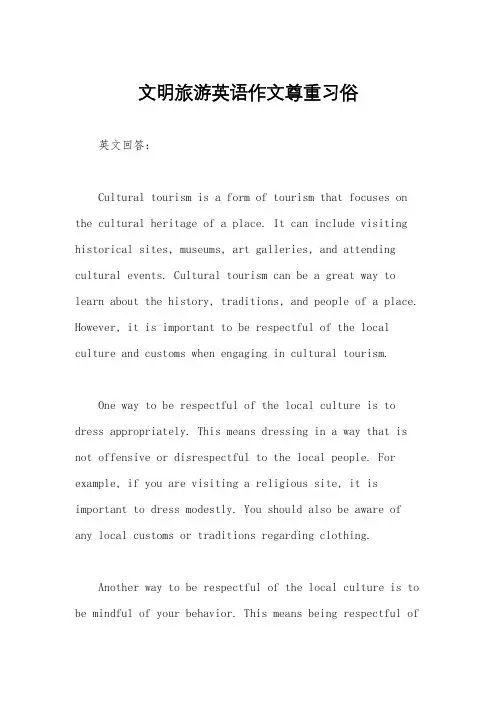
文明旅游英语作文尊重习俗英文回答:Cultural tourism is a form of tourism that focuses on the cultural heritage of a place. It can include visiting historical sites, museums, art galleries, and attending cultural events. Cultural tourism can be a great way to learn about the history, traditions, and people of a place. However, it is important to be respectful of the local culture and customs when engaging in cultural tourism.One way to be respectful of the local culture is to dress appropriately. This means dressing in a way that is not offensive or disrespectful to the local people. For example, if you are visiting a religious site, it is important to dress modestly. You should also be aware of any local customs or traditions regarding clothing.Another way to be respectful of the local culture is to be mindful of your behavior. This means being respectful ofthe local people and their customs. For example, if you are visiting a sacred site, it is important to be quiet and respectful. You should also avoid any behavior that could be seen as disrespectful or offensive.It is also important to be respectful of the local environment. This means being careful not to damage or litter. You should also be aware of any local environmental regulations.By following these simple tips, you can help to ensure that your cultural tourism experience is a positive one for both you and the local people.中文回答:尊重习俗。
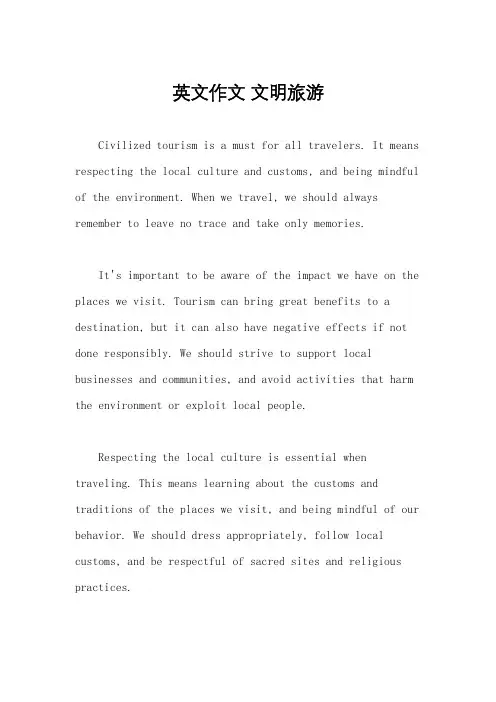
英文作文文明旅游Civilized tourism is a must for all travelers. It means respecting the local culture and customs, and being mindful of the environment. When we travel, we should always remember to leave no trace and take only memories.It's important to be aware of the impact we have on the places we visit. Tourism can bring great benefits to a destination, but it can also have negative effects if not done responsibly. We should strive to support local businesses and communities, and avoid activities that harm the environment or exploit local people.Respecting the local culture is essential when traveling. This means learning about the customs and traditions of the places we visit, and being mindful of our behavior. We should dress appropriately, follow local customs, and be respectful of sacred sites and religious practices.One of the best ways to practice civilized tourism is to be mindful of our waste and consumption. We shouldstrive to minimize our environmental impact by reducing, reusing, and recycling. This means using reusable water bottles, avoiding single-use plastics, and being conscious of our energy use.When we travel, it's important to be considerate of the local community. This means being mindful of our behavior and the noise we make, especially in residential areas. We should also be respectful of local wildlife and refrain from disturbing or feeding them.In conclusion, civilized tourism is about being respectful, responsible, and mindful when we travel. It's about leaving a positive impact on the places we visit, and being considerate of the local culture and environment. By practicing civilized tourism, we can ensure that ourtravels have a positive impact on the world.。
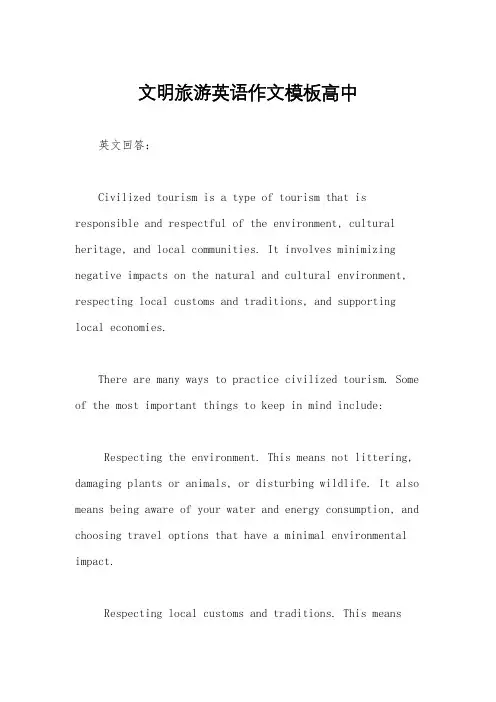
文明旅游英语作文模板高中英文回答:Civilized tourism is a type of tourism that is responsible and respectful of the environment, cultural heritage, and local communities. It involves minimizing negative impacts on the natural and cultural environment, respecting local customs and traditions, and supporting local economies.There are many ways to practice civilized tourism. Some of the most important things to keep in mind include:Respecting the environment. This means not littering, damaging plants or animals, or disturbing wildlife. It also means being aware of your water and energy consumption, and choosing travel options that have a minimal environmental impact.Respecting local customs and traditions. This meansdressing appropriately, being mindful of noise levels, and avoiding offensive behavior. It also means learning about the local culture and history, and being respectful of local beliefs and practices.Supporting local economies. This means spending money at local businesses, supporting local artisans, and choosing tour operators that are committed to sustainable tourism practices. It also means avoiding activities that exploit or harm local people.Civilized tourism is important because it helps to preserve the environment, protect cultural heritage, and support local communities. It also helps to create a more positive and rewarding travel experience for everyone.中文回答:文明旅游。
做一个文明游客的重要性英语作文加汉语The Importance of Being a Civilized Tourist (英文版)In today's interconnected world, tourism has become a global phenomenon, with millions of people traveling to different parts of the world every year. However, with this increase in tourism, there has also been a rise in irresponsible and disrespectful behavior by some tourists, causing damage to the environment, cultural sites, and the local communities they visit. Therefore, it is crucial for every tourist to understand and practice the importance of being a civilized tourist.Firstly, being a civilized tourist helps protect the environment. By following basic rules such as not littering, respecting wildlife, and conserving water and energy, tourists can minimize their impact on the natural environment. This not only ensures that the places they visit remain pristine and beautiful for future generations, but also helps protect the local ecosystems and wildlife.Secondly, being a civilized tourist respects the local culture and traditions. Each destination has its unique history, culture, and way of life. By respecting these differences and adhering to local customs and practices, tourists can avoidoffending the local population and create a more harmonious and enjoyable travel experience.Furthermore, being a civilized tourist contributes to the local economy. By shopping in local stores, eating at local restaurants, and hiring local guides, tourists can help support the local businesses and communities. This not only provides a source of income for the locals, but also helps preserve their culture and traditions.Lastly, being a civilized tourist sets a positive example for others. As tourists often represent their country or culture, their behavior can reflect on the entire nation. By demonstrating responsible and respectful behavior, tourists can inspire others to follow suit and create a more positive image of their country and culture.翻译(中文版)在当今互联互通的世界中,旅游业已成为全球现象,每年都有数百万人前往世界各地旅游。
文明出游英文作文英文:Traveling is a great way to explore different cultures and broaden your horizons. As a civilized traveler, it is important to respect local customs and traditions, and to be mindful of the impact you have on the environment and the local community.One way to be a responsible traveler is to do your research before you go. Learn about the local customs and etiquette, and be sure to pack appropriately for the climate and cultural expectations. For example, in some countries it is considered disrespectful to wear revealing clothing or to show public displays of affection.Another important aspect of being a civilized traveler is to be mindful of your impact on the environment. This means being conscious of your use of resources, such as water and electricity, and minimizing waste by usingreusable items and avoiding single-use plastics.Finally, it is important to support the local community by shopping at local markets and eating at locally-owned restaurants. This not only supports the local economy, but also allows you to experience the local culture and cuisine.中文:旅行是探索不同文化和拓宽视野的好方法。
Title: The Importance of Civilized Travel Among High School StudentsIn today's interconnected world, travel has become an integral part of the lives of high school students,offering opportunities to broaden horizons, experience different cultures, and learn valuable life lessons. However, it is crucial that we, as young travelers, approach our journeys with civility and respect for the places we visit. Civilized travel not only enhances our own travel experiences but also contributes to the preservation of cultural heritage and environmental sustainability.Firstly, civilized travel promotes cultural exchange and understanding. When we visit a new place, we are not just exploring its physical beauty; we are also engaging with its history, culture, and people. By behaving in a respectful and polite manner, we can create a positive impact on the local community and foster mutual understanding and friendship. For instance, respectinglocal customs and traditions, avoiding loud and obnoxious behavior, and being mindful of our actions can go a long way in promoting harmonious cultural exchanges.Secondly, civilized travel contributes to environmental sustainability. As responsible travelers, we should aim to minimize our negative impact on the environment. This includes reducing waste, conserving energy, and respecting the natural habitats of local flora and fauna. Bypracticing sustainable travel habits, we can contribute to protecting the beauty of the places we visit for future generations to enjoy.Moreover, civilized travel reflects our character and values. The way we behave while traveling says a lot about our character and the values we uphold. By exhibitingpolite and respectful behavior, we not only enhance our own reputation but also contribute to the positive image of our school and community.In conclusion, civilized travel is crucial for high school students. It promotes cultural exchange and understanding, contributes to environmental sustainability, and reflects our character and values. As young travelers, we should always strive to behave in a respectful andpolite manner, respecting the people, culture, and environment of the places we visit. By doing so, we cancreate a positive impact on the world and make our travel experiences even more enriching and memorable.**文明出游在高中生中的重要性**在当今这个互联的世界里,旅行已经成为高中生生活中不可或缺的一部分,为他们提供了拓宽视野、体验不同文化和学习宝贵人生经验的机会。
文明出游英语作文高中Traveling is an essential part of our lives. It allows us to explore new cultures, meet new people, and experience new things. Traveling not only broadens our horizons but also helps us relax and rejuvenate. In this essay, I will discuss the importance of civilized travel and some tipsfor a smooth and enjoyable trip.First and foremost, civilized travel is important because it promotes respect and understanding among different cultures. When we travel to a new place, it's crucial to be aware of and respect the local customs, traditions, and laws. This not only shows respect for the people and their culture but also helps to avoid any misunderstandings or conflicts.Additionally, civilized travel means being mindful of the environment and the impact our travels have on it. It's important to travel responsibly, reduce our carbon footprint, and support sustainable tourism practices. This can be achieved by choosing eco-friendly accommodations, reducing plastic waste, and supporting local businesses and initiatives that promote environmental conservation.Furthermore, being considerate and respectful towards other travelers is also a key aspect of civilized travel. This means being mindful of our behavior in public spaces, such as being quiet in crowded places, not littering, and respecting personal space. It's important to be aware ofour surroundings and to be considerate of others,especially in places with different cultural norms and customs.In addition to these principles, there are somepractical tips that can help ensure a smooth and enjoyable travel experience. Firstly, it's important to plan aheadand do thorough research about the destination, includingits culture, customs, and local laws. This can help avoid any misunderstandings or cultural faux pas.Secondly, it's important to be open-minded and adaptable. Traveling to new places often means encountering different ways of life, and it's important to embrace thesedifferences with an open heart and mind. This can lead to richer and more meaningful travel experiences.Furthermore, it's important to travel light and bemindful of our belongings. This not only makes it easier tomove around but also reduces the risk of losing or misplacing items. It's also important to be respectful ofthe local environment and wildlife, such as not disturbing natural habitats or wildlife.In conclusion, civilized travel is essential for promoting respect, understanding, and sustainability. By being mindful of local customs, traditions, and the environment, and by being considerate towards other travelers, we can contribute to a more positive andenriching travel experience for everyone. I hope these tips will help you have a smooth and enjoyable trip.文明出游是我们生活中必不可少的一部分。
英文作文文明旅游英文:Civilized tourism is a concept that is gaining more and more attention in recent years. As a traveler, I believe that it is important to be respectful and responsible when visiting other countries and cultures. One way to do thisis by practicing good manners and following local customs.For example, when visiting a temple or shrine in Japan, it is customary to remove your shoes before entering. This shows respect for the sacred space and the local culture. Another example is when visiting a mosque in a Muslim country, it is important to dress modestly and cover your head as a sign of respect.In addition to respecting local customs, it is also important to be mindful of the impact we have on the environment and local communities. We should strive to minimize our waste and reduce our carbon footprint by usingpublic transportation and supporting eco-friendly initiatives.Ultimately, practicing civilized tourism not only benefits the places we visit, but also enriches our own travel experiences by allowing us to fully immerseourselves in the local culture and build meaningful connections with the people we meet.中文:文明旅游是一个近年来越来越受到关注的概念。
关于文明旅游英语作文Title: Exploring Cultural Tourism。
In today's globalized world, cultural tourism has become increasingly popular as people seek to immerse themselves in the rich tapestry of different civilizations. From ancient ruins to vibrant festivals, cultural tourism offers a window into the heritage, traditions, and way oflife of diverse communities around the globe. In this essay, we will delve into the significance of cultural tourism,its benefits, and how it fosters mutual understanding among nations.Firstly, cultural tourism serves as a bridge between nations, fostering mutual respect and understanding. When tourists visit a foreign land to explore its culture, they engage with local customs, traditions, and history. This interaction promotes empathy and appreciation for cultural diversity, breaking down stereotypes and fostering a senseof global citizenship. For instance, a visitor to China mayparticipate in traditional tea ceremonies, learn about Confucian philosophy, or marvel at the Great Wall, gaining insight into the depth and richness of Chinese civilization.Moreover, cultural tourism contributes significantly to the preservation of heritage sites and traditions. Many historical landmarks and cultural practices are at risk of being lost due to neglect, urbanization, or globalization. However, the influx of tourists provides economicincentives for local communities to conserve their heritage. Governments and organizations often invest in therestoration and maintenance of cultural sites to attract visitors, thereby safeguarding these treasures for future generations. For example, the restoration of the Angkor Wat temple complex in Cambodia not only attracts tourists but also preserves this UNESCO World Heritage site for posterity.Furthermore, cultural tourism stimulates economic development and promotes sustainable growth in local communities. When tourists visit a destination toexperience its culture, they contribute to the localeconomy by spending on accommodation, transportation, food, souvenirs, and cultural experiences. This influx of revenue creates employment opportunities, supports small businesses, and enhances infrastructure. Additionally, cultural tourism encourages sustainable practices by promoting eco-friendly initiatives, responsible travel behavior, and community involvement. For instance, homestay programs allow tourists to live with local families, fostering cultural exchange while minimizing environmental impact.However, cultural tourism also poses challenges and risks, such as overtourism, cultural commodification, and authenticity loss. Overtourism occurs when the number of visitors exceeds the carrying capacity of a destination, resulting in environmental degradation, overcrowding, and strain on local resources. Popular sites like the Taj Mahal in India or Machu Picchu in Peru often grapple with overtourism, necessitating measures to manage visitor flows and preserve the integrity of these landmarks. Additionally, cultural commodification occurs when traditional practicesor artifacts are commercialized for tourist consumption, leading to their dilution or distortion. It is essential tostrike a balance between tourism development and cultural preservation, ensuring that local communities benefit without compromising their heritage.In conclusion, cultural tourism offers a unique opportunity to explore the world's cultural diversity, promote mutual understanding, and support sustainable development. By engaging with local communities, respecting their heritage, and embracing responsible travel practices, tourists can contribute positively to preserving and celebrating the world's cultural heritage for future generations to cherish. As we embark on our journeys to discover the wonders of the world, let us remember to tread lightly, with respect and appreciation for the cultures and traditions that enrich our global community.。
高中生英语作文及翻译:文明旅游
文明旅游 Behaved Tourism
When holiday comes, thousands of people pour into the tourist sites, they want to relax themselves and enjoy the beautiful scenery. But Chinese people have a bad habit, they like to leave some notes on the site, proving them have been here before. Such a behavior has been criticized by the public, because the leaving note will damage the preservation of the tourist site. Most of the tourist sites are part of
our country’s historical relics, these sites are priceless,
it is everyone’s duty to protect the s ites. When we go to travel, we should behave ourselves. First, we need to have
the idea that no rubbish being leaved behind when we leave
the site. We should take away what we bring, keep the environment clean. Second, no any notes being written in the sites. Though in the old days, Chinese workers like to leave their names on the sites, but now it is a new world, we need
to behave ourselves.
当节假日到来的时候,成千上百的人聚集在旅游景点,他们想要
放松,享受美丽的风景。
但是中国人有一个坏习惯,他们喜欢在景点
留下一些记号,证明以前在此旅游。
这样的行为遭到了大众的批评,
因为留下的记号会破坏景点的保存。
绝大部分景点是国内的历史文物,是无价的,保护文物是每一个人的责任。
当文明旅游时候,应该要规
范自己的行为。
第一,文明需要有这样的观点,当我们离开景点时,
不能留下垃圾,拿走带来的一切。
第二,不在景点留下记号。
虽然在
古代,中国的文人喜欢留下他们的名字,但是现在是新时代,我们要
规范自己的行为。